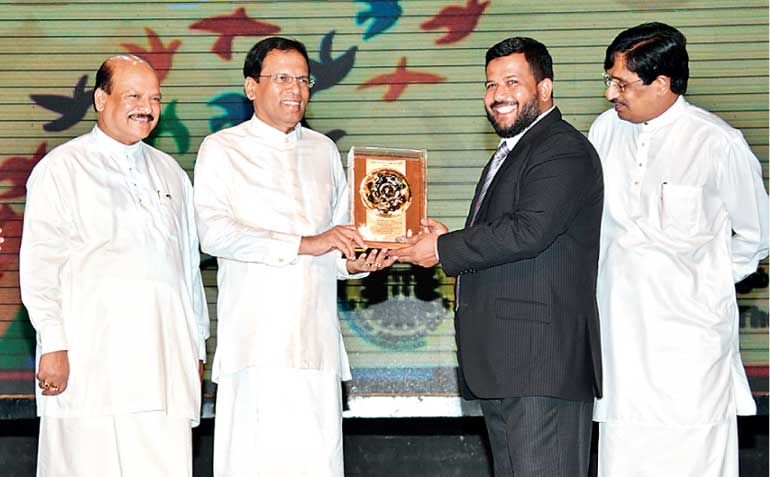Friday Feb 20, 2026
Friday Feb 20, 2026
Tuesday, 5 July 2016 00:05 - - {{hitsCtrl.values.hits}}
As Sri Lanka’s third economic force reported total value close to $ 3 billion, it is set to enter the next stage of development with a variety of support measures from the Government – including a National Cooperative Act, a Coop policy and the third cooperative university in South Asia set up in Sri Lanka.
“We have started work to launch the first ever cooperatives university in Sri Lanka before end of 2018,” said Minister of Industry and Commerce of Sri Lanka Rishad Bathiudeen. Minister Bathiudeen was addressing the International Coop Day celebrations of 2 July held in Colombo with the participation of President Maithripala Sirisena at the Nelum Pokuna Theatre. More than 1,200 members of Lankan cooperative system as well as Provincial Cooperative Ministers and Secretary to Ministry of Industry and Commerce TMKB Thennakoon were also present on the occasion.
 Minister of Industry and Commerce Rishad Bathiudeen hands over the official Int’l Coop Day celebration plaque to President Maithripala Sirisena at the Int’l Coop Day event held 2 July at the Nelum Pokuna Auditorium, Colombo
Minister of Industry and Commerce Rishad Bathiudeen hands over the official Int’l Coop Day celebration plaque to President Maithripala Sirisena at the Int’l Coop Day event held 2 July at the Nelum Pokuna Auditorium, Colombo
“Cooperative is an important factor for rural Sri Lanka – among rural consumers, credit, finance, agriculture and livestock. It helps us to achieve the Sustainable Development Goals. In this background I am pleased of International Cooperative Alliance’s support extended early this week to UN’s 2030 Agenda for Sustainable Development. Even the turnover of the world’s top 300 cooperatives in 25 countries increased by 7% to $ 2.4 trillion in 2013. Sri Lankan cooperative system plays an important role in our lives. Almost 8 million Sri Lankans are members of some cooperative.
“This is the only market system in the country with such a high number of members and 56% of them are women. Lankan coops employ 46,000, has an overall value of $ 2.8 billion – that is assets of $ 1.8 billion and another $ 1 billion in savings. In fact coops are almost the third economic force in Sri Lanka,” said Minister Bathiudeen.
“Cooperatives are so strong in our retail market that I am pleased to say that according to the 2015 market survey called ‘Wallet Monitor’ by the leading market research firm ‘Lanka Market Research Bureau’ of UK’s Kantar Group Out of all the top six supermarket brands our coop-city cooperative shop is the third ranking supermarket for purchases among Sri Lankan households. We have started work to launch the first ever cooperatives university in Sri Lanka before end of 2018, under the NICD of my Ministry.
“We are also working to introduce first ever National Cooperative Policy. Given the contribution of cooperatives to the country, today I request President Maithripala Sirisena to allow each cooperative to purchase a vehicle, on a duty free basis. My ministry has allocated Rs. 287.5 million to start 150 mini handloom apparel factories through the cooperative system creating 3,150 new jobs. Money is ready now,” he added.
Minister Bathiudeen is now planning to upgrade his National Institute of Cooperative Development (NICD) to a university level institution to become Sri Lanka’s first ‘Cooperative Management University’ by 2018. At present there are only two fully fledged such universities in Asia-India’s Rajiv Gandhi University of Co-operative Management in Assam and Malaysia’s Cooperative College.”
President Sirisena, addressing the event said that himself being a cooperative employee at one time, is now proud to see the sector’s performance and role in Sri Lanka’s economy. “It is time to introduce a Legislative Act to strengthen the sector. Minister Bathiudeen’s proposal to allow cooperatives to import vehicles duty free is a good one and I will focus on a Cabinet Paper to give duty free lorries to coops in 2017-2018.”
The huge majority of 14,454 cooperative societies in Sri Lanka are reporting profits with only a few at break-even and even a less number making losses. Earliest records of co-operatives come from Scotland in 1761. The modern cooperative movement began in England in 1844. Since then this system rapidly grew. Sri Lanka’s cooperatives movement started way back in year 1904 with the opening of a rural credit society in the Central Province. At present there are 14454 cooperatives in various productions services, SMEs, women’s development, rural banking, insurance and farming, active in Sri Lanka. Among some well-known Lankan cooperative brands are Ceyesta mattresses and the Rural Bank.